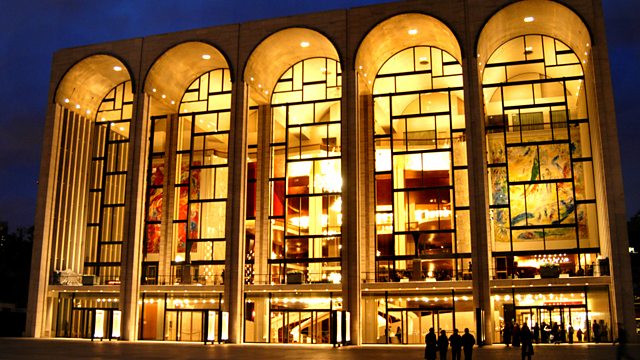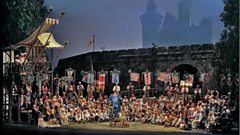
Wagner's Die Meistersinger
Live from the Metropolitan Opera, New York, Wagner's epic comedy Die Meistersinger. With soprano Annette Dasch as Eva and Johan Botha as Walther. James Levine conducts.
James Levine returns to Wagner with a signature run of this epic comedy, back at the Met for the first time in eight years. Walther wants to marry Eva, but is only allowed do so if he wins the song contest held by the local guild of mastersingers. His self-taught method of song writing breaks all the complicated rules, but fortunately the wise Hans Sachs is on hand to offer advice on both song-writing and love. Michael Volle sings the central role of Hans Sachs. Johan Botha reprises his indomitable Walther, and the elegant Annette Dasch is Eva.
Presented Live from the Met by Margaret Juntwait and Ira Siff.
Wagner: Die Meistersinger von N眉rnberg
Eva.....Annette Dasch (Soprano)
Magdalene.....Karen Cargill (Mezzo-soprano)
Walther von Stolzing.....Johan Botha (Tenor)
David.....Paul Appleby (Tenor)
Hans Sachs.....Michael Volle (Baritone)
Beckmesser.....Johannes-Martin Kranzle (Baritone)
Pogner.....Hans-Peter K枚nig (Bass)
Nightwatchman.....Matthew Rose (Bass)
New York Metropolitan Opera Orchestra
New York Metropolitan Opera Chorus
James Levine (Conductor).
Last on
Synopsis
ACT I.聽As the congregation of St. Katherine's Church sings a closing hymn, the young knight Walther von Stolzing tries to catch the eye of Eva Pogner. After the parishioners have filed out, she informs her suitor that she is to be betrothed the next day to the winner of a song contest sponsored by the local Mastersingers. Eva's companion, Magdalene, tells her sweetheart, David, apprentice to the cobbler and poet Hans Sachs, to explain the rules of song composing to Walther, who is taken aback by the complicated ins and outs of mastersinging. David's fellow apprentices set up for a preliminary song trial, and the Masters arrive; but before the group's secretary, Kothner, can call the roll, Walther applies for the contest, making an enemy of fellow contestant Beckmesser, the town clerk - a spiteful, jealous pedant, suspicious of anything new. As proof that tradesmen value art, Pogner offers his daughter's hand as prize for the next day's contest. When Sachs suggests that Eva - and the people - should have some say in the matter, Pogner announces she may reject the winner but must marry a Mastersinger. Now Walther introduces himself, describing his self-taught, natural methods of composition. Going on to his trial song, Walther sings an impulsive, free-form tune, breaking all the Masters' rules, punctuated by Beckmesser's chalk and slate to count the errors. Rejected by the Masters, the young knight stalks out, leaving Sachs to muse on the distinctive appeal of Walther's melody.
ACT II.聽That evening, as David's fellow apprentices playfully end their day, David tells Magdalene how badly Walther fared. Eva, arriving with her father, gets the sad news from Magdalene. Across the street, Sachs sets up shop in his doorway; the scent of lilacs and the memory of Walther's song, however, distract him. Eva visits the cobbler, and though she confesses she would be glad if Sachs himself won the contest, her dismay at his pretended disapproval of Walther betrays her true feelings. Running off in a huff, she is intercepted by Walther, who begs her to elope with him, and they hide when the Night Watchman passes. Sachs lights the street with a lantern, forcing the lovers to stay hidden while Beckmesser arrives to serenade Eva, whom Magdalene impersonates in Pogner's window. When the clerk begins his tune, however, Sachs launches into a lusty cobbling song, pleading a need to finish his work. At length they agree that Sachs will drive a nail only when Beckmesser breaks a rule of style. The ensuing racket increases when David jealously attacks the clerk for apparently wooing Magdalene, and the nightshirted neighbors join in a free-for-all until the Watchman's horn disperses them. Pogner leads Eva inside while Sachs drags Walther and David into his shop; the Watchman intones the hour.
ACT III.聽Reading a book in his study the next morning, Sachs forgives David his unruly behavior and bids him recite his St. John's Day verses. Alone, the cobbler ponders the world's madness, then greets Walther, who tells of a wondrous dream. Sachs recognizes a potential prize song; taking down the words, he helps the knight fashion them with an ear for form and symmetry. When they depart, Beckmesser limps in and noses around. Pocketing Walther's poem, he is caught by Sachs, who tells him to keep it. Beckmesser, certain of victory, rushes out. Eva now visits Sachs on the pretext of a pinching shoe; Walther returns dressed for the festival and repeats his prize song for her. She is torn between the two men, but the wise older man turns her to the younger. When Magdalene comes in, Sachs promotes David to journeyman with a box on the ear and asks Eva to bless the new song, which all five join in praising. Then they go off to the contest.
In a meadow outside the city, guilds and citizens assemble under festive banners. After a joyful waltz, the Masters file in, Sachs getting a spontaneous hand from his people, which in turn inspires moving thanks from him. The contest opens as Beckmesser nervously tries to fit Walther's verses to his own music but forgets the words and distorts them, earning laughter from the crowd. The clerk turns furiously on Sachs and stumbles off. After rightful delivery of the song by Walther, the people are entranced, but Walther refuses the Masters' medallion. Sachs, however, convinces him otherwise, extolling tradition and its upholders as well as its fresh innovators. Youth makes its pact with age, Walther has won Eva, and the people hail Sachs once more as Eva crowns him with Walther's wreath.
by John W. Freeman聽
-- courtesy of Opera News
Broadcast
- Sat 13 Dec 2014 17:00大象传媒 Radio 3

